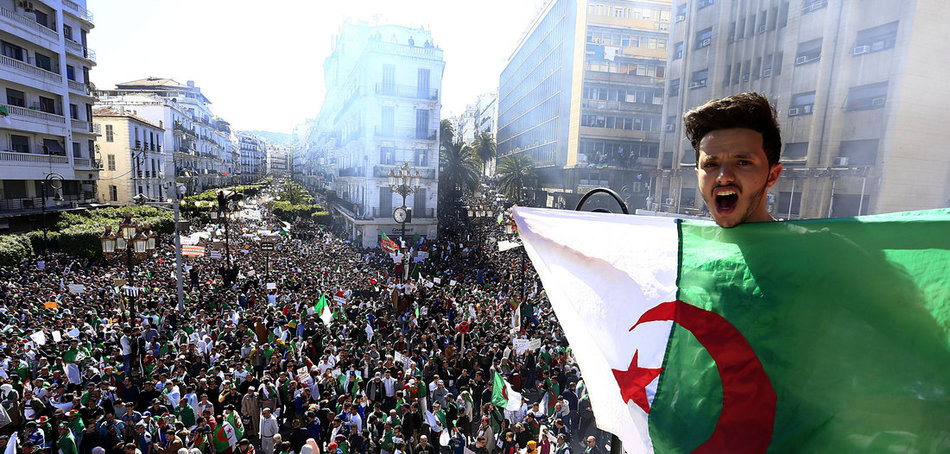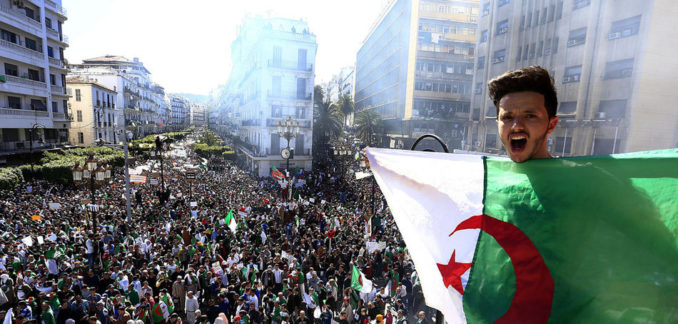

Anti-government protest in Algiers on March 15
Beginning Feb. 22, hundreds of thousands of Algerians took to the streets of every city in Algeria — from Oran and Tlemcen in the west, through Algiers and Tizi Ouzou in the center, to Constantine and Skikda in the east — to tell President Abdelaziz Bouteflika and his family that Bouteflika was not going to get a fifth term in office.


Anti-government protest in Algiers on March 15.
Even in the south of Algeria, in towns and cities scattered in oases plunked here and there in the Sahara, from Ouargla to Ain Salah passing by Adrar and totally isolated Illizi, thousands of people came out into the streets demanding “no” to a fifth term for Bouteflika.
Any of the candidates for parliament brave or foolhardy enough to be on the streets where demonstrations were taking place were met with cries of “Resign!”
Besides demanding that Bouteflika retire, angry denunciations flowed from the hard life Algerians face: high unemployment, inflation, police surveillance, the arbitrary behavior of government officials, and corruption which produces a burning sensation of frustration, rancor and humiliation. (tinyurl.com/y2cv586h)
YouTube videos of recent protests on Place Maurice Audin in the center of Algiers show this huge, wide square completely filled with people and signs, banners and placards. Signs were in Arabic, French, Tamazight (known as Berber), Spanish and English. There was music, singing and organized chanting. Men and women — some wearing a hijab, some without any head covering — and families were all mixed together.
While there are a number of opposition parties, ranging from the Algerian Party for Democracy and Socialism (PADS), which considers itself communist, the Socialist Forces Front (FFS) to the Islamic Salvation Front (FIS), they have not played a significant role in calling this month of nearly daily protests.
Youth and students have coordinated through social media, bringing out students at all 48 Algerian universities, and the Union Confederation of Productive Forces (COSYFOP: Confédération Syndicale Des Forces Productives), which called a 4-day general strike, had more impact.
Even after Bouteflika had announced that he was not going to run for a fifth term, protests continued, especially after he said he was going to continue in office. The way Algerians summed it up was wry but expressed a steely determination: We protested for five weeks for elections without Bouteflika, now we have Bouteflika without elections.
In the past, big outpourings of mass discontent in Algeria have been met with vigorous, and sometimes bloody, repression. But these protests have been so massive and so widespread that the Algerian state held back, although some of the early protests were met with tear gas and baton charges.
Accumulation of grievances
Beginning the third week of March, cracks began to appear. The National Liberation Front (FLN), Algeria’s ruling party, officially abandoned its support for Bouteflika’s bid for a fifth term, saying it supported the protesters. The army chief of staff also indicated that the army supported the protests. (tinyurl.com/y3ojsvv9)
Algerian web services began to run pictures of cops marching in the protests in their uniforms, and a few days later pictures began appearing of soldiers, even officers, also marching. (tinyurl.com/y4wlxb76)
While the United States is careful not to be seen obviously poaching in France’s backyard, the State Department’s website does say: “Algeria is a strategically located and capable partner with which the United States has strong diplomatic, law enforcement, economic, and security cooperation.” The Algerian army is also participating in Flintlock 2019 organized by Africom. (tinyurl.com/y6aqfuyp)
France is also deeply interested in what is happening. Hundreds of thousands of Algerians, some with deep ties to their homeland, others like the harkis — Algerians who fought for the French in their War of a Million Martyrs 1954-62 — who are more ambivalent, live and work in France. The economic ties between France and Algeria are old, deep and very significant. Over half of Algeria’s international trade is with the European Union.
In the 1990s there was a bloody and costly civil war in Algeria between armed groups owing their political allegiance to the Islamic Salvation Front (FIS) and the Algerian army, whose political direction came from the FLN.
The FIS lost, but the scars remained. The Algerian army selected Abdelaziz Bouteflika in 1999 to manage the transition to a more stable political system, which still left the same small group of officers and businesspeople in charge. High prices for oil — Algeria’s main export — and vigorous police repression enabled the system to overcome any protests.
But given the fall in oil prices and the lack of real economic development, the accumulation of grievances finally brought out hundreds of thousands of Algerians.
The Algerian people are conscious of their revolutionary history, and they are in the streets demanding not just the resignation of President Bouteflika but real changes in the system.
The epic struggle of the Palestinian people against the full weight of U.S. imperialism and…
The following report comes from the Bronx Anti-War Coalition organizers on a protest held in…
In the Canadian federal elections held on April 28, the Liberals won with 169 seats…
The following is Part 2 of a talk given by the author to a meeting…
Boston Students, professors and workers are confronting the Trump administration’s fascist crackdown at universities across…
Philadelphia Within days of Swarthmore students reviving a pro-Palestinian encampment on April 30, police arrested…